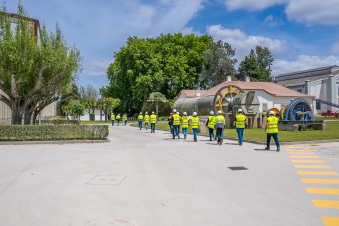How investment and innovation can position Portugal for a journey of increased competitiveness.
Over the past ten years, we have witnessed a deleveraging effort in Portugal, both in the public and private sectors, in response to the over-indebtedness of the previous decade. As a result of the efforts of families and businesses, the reality we face today is different, and the country’s main priority is to accelerate its potential for competitiveness and growth in a lasting way.
Portugal needs capital, and for this, it must have the mission of attracting, developing, and retaining larger companies that can drive our growth and allow for increases in productivity and value creation for the economy.
Looking at the next decade, it becomes imperative for Portugal to aspire to have more national companies with global scale. These companies will have the capacity to invest nationally and internationally, contributing to increased productivity, creating better conditions for talent, and fostering a dynamic ecosystem around them, promoting clusters of small and medium-sized enterprises. This year, we witnessed a wave of Public Acquisition Offers (PAOs) in foreign markets such as Finland, Spain, and the United Kingdom, promoted by national business groups like Sonae, Grupo Mello, or Navigator, showing that, although few, large Portuguese companies are ambitious and focused on investing in the future. We must reinforce this willingness and show the ability to execute more movements like these.
Moreover, it is the companies with scale that are often catalysts and agents of transformation, dynamos of responsible leadership that stimulate innovation and create the conditions for talent to rise. This is a responsibility and a duty to make Portugal more competitive. Enhancing talent by contributing to its development and, by extension, to the country’s economic growth.
Similarly, medium-sized companies with solid competitive bases and a strong export component must assert themselves in the global market. We need more examples like those we see in sectors as diverse as education (management schools) or the cycling cluster, sectors that have opened up to the world and, in a relatively short time, have taken solid steps and become references in their areas of activity and an example to repeat in the next ten years.
In startups too, we have various movements of companies born with global ambition, supported by teams with the ability to create disruptive solutions. When daring is combined with this creative capacity, it is possible to have extraordinary results in a decade. Portugal is an example of this, with a high number of successful startups (“unicorns”) when compared to larger countries like France, Spain, and Italy – Portugal has 0.59 unicorns per million people. Spain has 0.25, France 0.4, and Italy 0.03.
When ambition, investment, and talent come together, results tend to appear. Why not take on increasing competitiveness as the main goal for Portugal?
To achieve this purpose, all stakeholders in the country need to be aligned with this vision. When we look at the main published competitiveness indices, the dimension of bureaucracy repeatedly penalizes Portugal’s position in these rankings.
We will not achieve growth without investment, and often the willingness to invest runs into the decision-making capacity of public entities responsible for the necessary authorizations and licensing. We need timely and quick response capacity, whether positive or negative, because uncertainty and delays translate into increased costs, inertia, aversion to investment, and loss of competitiveness.
Debureaucratization, efficient and practical regulation, and a competitive tax system are crucial to attracting capital. It is essential to combat this situation and have the ambition to position Portugal as one of the best countries to invest in and an innovation center for the world in the coming years.
These challenges unfortunately cross borders. Like Portugal, Europe also faces the urgent need to reorient its focus on innovation and value creation, rather than prioritizing excessive regulation. Proof of this is the recent report presented by Mario Draghi that highlights Europe’s lag, particularly compared to the US and China, suggesting a more robust budget to foster innovation and reduce bureaucracy.
These structural reforms at the state level are necessary to attract capital and accelerate growth in our country, but a daily positive and pragmatic attitude from each of us, both in the public and private sectors, is also urgent to achieve a shared goal of having a more competitive country.
Let’s be ambitious and create the necessary conditions for the Portuguese and our economy to assert themselves and reach their full potential. This is the moment to look to the future with determination and work to make Portugal the protagonist of competitiveness and wealth creation in the next decade.





